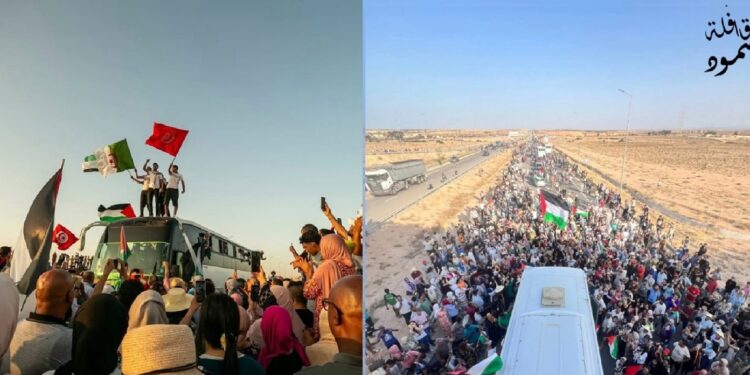Part of Tunis on June 9, the Maghreb caravan called Soumoud (Resistance) continues its journey towards Gaza with an intact determination, but uncertainty grows as the Egyptian border approaches. No visa has yet been granted, and Cairo remains silent.
Composed of just over 1,500 people from five Maghreb countries – Tunisia, Algeria, Morocco, Mauritania, Libya – This citizen initiative intends to break the Arab silence around the war in Gaza. University, artists, doctors, young students, human rights activists and associative figures gathered around an objective: to physically carry a message of solidarity with the population of Gaza, besieged and devastated for 20 months by an unprecedented Israeli military campaign.
A march against erasure
Aboard about twenty buses and 350 cars decorated with Palestinian flags and support slogans, the caravan left Tunis in a rare popular fervor. The messages are clear: “No to genocide, no to silence”, “the peoples with Gaza, despite the borders”. In the background, the heavy record of war: nearly 55,000 Palestinian deaths, according to the Gaza health authorities, including a majority of women and children.
Faced with what they describe as crime against humanity, the Maghreb states have remained behind, contenting themselves with diplomatic press releases. It is this void that the caravan tries to fill: “When the states are silent, the peoples must speak,” says Karim, a young Algerian doctor met on the Libyan border.
Warm welcome in Libya, potential blocking in Egypt
The convoy crossed the position of Ras Jedir without difficulty, between Tunisia and Libya, then crossed the coastal cities to the outskirts of East Libyan. There, local communities offered them food, fuel and accommodation, often improvised in schools or mosques. Popular solidarity works, but the shadow of the Egyptian lock already hovers.
Indeed, Egypt has to date have given no passage agreement. The daily Asharq al-Awsat says the authorities have not taken “No clear decision” As for the transit of the caravan. According to several Egyptian security sources, mentioned anonymously, the diversity of nationalities and the non -institutional nature of the mission would be problematic.
The stumbling block: visas. The Egyptian government requires prior visas for any land entry. However, no member of the caravan has yet received a visa to date, as confirmed by Wael Nawar, group spokesperson:
“We have submitted the necessary files, but no response reached us from the Egyptian consular authorities. »»
Rafah: the last breach, under control
Rafah’s border post, connecting Egypt to the Gaza Strip, has become a strategic symbol. Closed, reopened, then restricted in the dropper since the start of the war, it is the only non-Israeli access point to Gaza. But Egypt, taken between its security alliances, its regional diplomacy and its fear of uncontrollable mobilization, manages this point as a waterproof SAS.
The caravan, although humanitarian, does not enter any official pattern. Neither accredited NGOs, nor diplomatic mission, she embodies a disturbing moral challenge. And it is this spontaneous, transnational and popular character that seems to worry Cairo.
Symbolic mobilization, even without crossing
The organizers are lucid. They do not necessarily expect to enter Gaza. “The main thing is to recall that Gaza is not forgotten,” says Mouna, a Tunisian student, draped in a keffiieh. “If we are blocked, it will be more proof that the Arab world is paralyzed. »»
The convoy should reach the Libyan eastern border area in the coming 48 hours, near the Sinai desert. Informal discussions would be underway with civil and religious intermediaries to try to unlock the situation.
But the obstacles remain: extreme climatic conditions, fragile logistics, unstable security, and above all lack of legal status in the face of the Egyptian authorities.
The Soumoud caravan embodies a rare attempt at direct Arab action, apart from state devices. She challenges, embarrassments, inspires. Whether or not Rafah crosses, she will have imposed another story, that of a people who refuses to look away.








